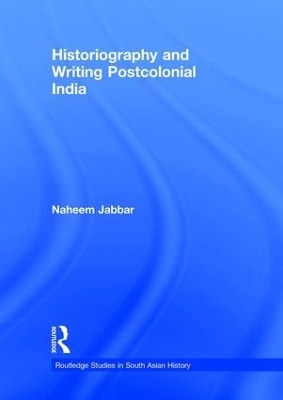
Historiography and Writing Postcolonial India
Seiten
2009
Routledge (Verlag)
978-0-415-48847-1 (ISBN)
Routledge (Verlag)
978-0-415-48847-1 (ISBN)
Offers an examination of post-colonial Indian history-writing. This book examines some of the archetypal elements in historical consciousness that find their echo in often brutal unhistorical ways in everyday life.
A critical examination of post-colonial Indian history-writing.
In the years preceding formal Independence from British colonial rule, Indians found themselves responding to the panorama of sin and suffering that constituted the modern present in a variety of imaginative ways. This book is a critical analysis of the uses made of India’s often millennial past by nationalist ideologues who sought a specific solution to India’s predicament on its way to becoming a post-colonial state. From independence to the present, it considers the competing visions of India’s liberation from her apocalyptical present to be found in the thinking of Gandhi, V. D. Savarkar, Nehru and B. R. Ambedkar as well as V. S. Naipaul and Salman Rushdie. It examines some of the archetypal elements in historical consciousness that find their echo in often brutal unhistorical ways in everyday life.
This book is a valuable resource for researchers interested in South Asian History, Historiography or Theory of History, Cultural Studies, English Literature, Post Colonial Writing and Literary Criticism.
A critical examination of post-colonial Indian history-writing.
In the years preceding formal Independence from British colonial rule, Indians found themselves responding to the panorama of sin and suffering that constituted the modern present in a variety of imaginative ways. This book is a critical analysis of the uses made of India’s often millennial past by nationalist ideologues who sought a specific solution to India’s predicament on its way to becoming a post-colonial state. From independence to the present, it considers the competing visions of India’s liberation from her apocalyptical present to be found in the thinking of Gandhi, V. D. Savarkar, Nehru and B. R. Ambedkar as well as V. S. Naipaul and Salman Rushdie. It examines some of the archetypal elements in historical consciousness that find their echo in often brutal unhistorical ways in everyday life.
This book is a valuable resource for researchers interested in South Asian History, Historiography or Theory of History, Cultural Studies, English Literature, Post Colonial Writing and Literary Criticism.
Naheem Jabbar is Lecturer in Sociology at the University of Portsmouth, UK.
Preface: Historiography and Writing Postcolonial India Part 1: Re-thinking Indian Histories 1. Historiography and Narrative 2. The Historical Sense 3. Hindutva and Writing Postcolonial India 4. B.R. Ambedkar and the Hindu Past Part 2: Re-imagining Indian Pasts 5. V.S. Naipaul’s India: History and the Myth of Antiquity 6. Salman Rushdie and the Agon of the Past. Conclusion
| Erscheint lt. Verlag | 24.6.2009 |
|---|---|
| Reihe/Serie | Routledge Studies in South Asian History |
| Verlagsort | London |
| Sprache | englisch |
| Maße | 156 x 234 mm |
| Gewicht | 630 g |
| Themenwelt | Geschichte ► Allgemeine Geschichte ► Zeitgeschichte |
| Geisteswissenschaften ► Geschichte ► Geschichtstheorie / Historik | |
| Geisteswissenschaften ► Geschichte ► Regional- / Ländergeschichte | |
| Geisteswissenschaften ► Sprach- / Literaturwissenschaft ► Anglistik / Amerikanistik | |
| Geisteswissenschaften ► Sprach- / Literaturwissenschaft ► Literaturwissenschaft | |
| Naturwissenschaften ► Geowissenschaften ► Geografie / Kartografie | |
| Sozialwissenschaften ► Soziologie ► Spezielle Soziologien | |
| ISBN-10 | 0-415-48847-8 / 0415488478 |
| ISBN-13 | 978-0-415-48847-1 / 9780415488471 |
| Zustand | Neuware |
| Haben Sie eine Frage zum Produkt? |
Mehr entdecken
aus dem Bereich
aus dem Bereich
Gewalt, Umwelt, Identität, Methode
Buch | Softcover (2024)
Spector Books OHG (Verlag)
CHF 49,95
wie Freud im Kollektiv verschwand
Buch | Hardcover (2024)
Klett-Cotta (Verlag)
CHF 34,95


